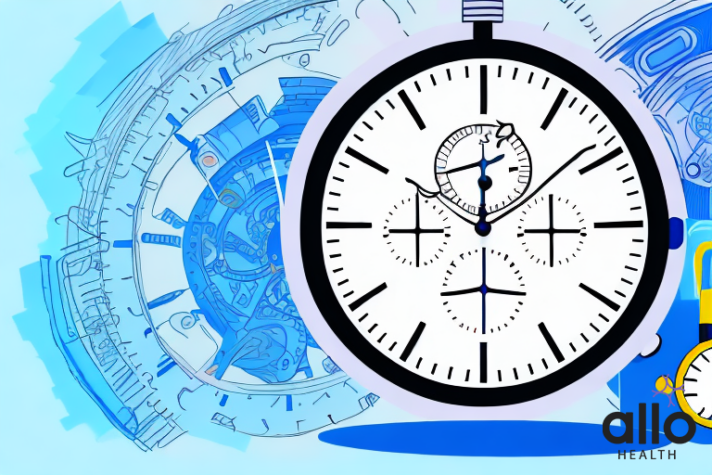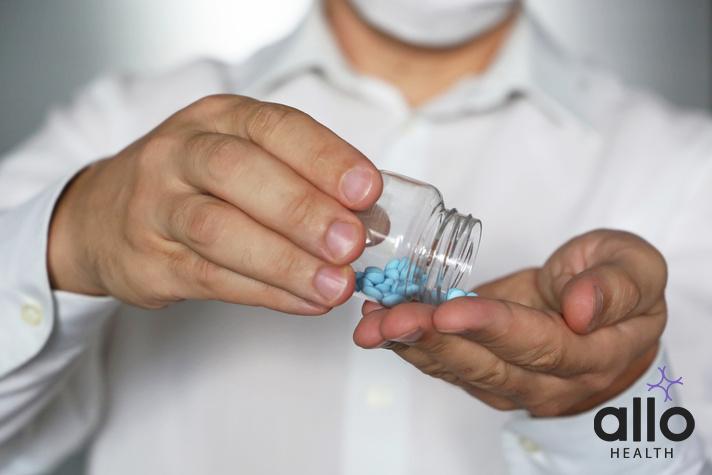Is 2 Minutes Ejaculation Premature?

Allo Health is dedicated to personalized well-being, offering support and trusted information tailored to individual health goals. The platform emphasizes human-generated content, led by a distinguished medical team of experts, including physicians and sexual health specialists. Their commitment to credibility involves rigorous fact-checking, authoritative research, and continuous updates to ensure accurate, up-to-date information. Allo Health's unique approach goes beyond conventional platforms, providing expert-led insights and a continuous commitment to excellence, with user feedback playing a crucial role in shaping the platform's authoritative voice.

Dr. Raj. R holds an undergraduate medical degree from the Philippines, and has a bachelors background in Psychology. His experience working in the field of urology further brought his interest forward in working towards his passion of understanding the science of attraction, intimacy, sex and relationships. A key motto he practices by remains unprejudiced and non-judgemental care.
Why This Was Upated?
Our experts continually monitor the health and wellness space, and we update our articles when new information became available.
Updated on 11 April, 2024
- Article was updated as part of our commitment to diversity, equity, and inclusion.

"The following blog article provides general information and insights on various topics. However, it is important to note that the information presented is not intended as professional advice in any specific field or area. The content of this blog is for general educational and informational purposes only.
Book consultation
The content should not be interpreted as endorsement, recommendation, or guarantee of any product, service, or information mentioned. Readers are solely responsible for the decisions and actions they take based on the information provided in this blog. It is essential to exercise individual judgment, critical thinking, and personal responsibility when applying or implementing any information or suggestions discussed in the blog."
When it comes to sexual performance, men often worry about the duration of their ejaculation and this can impact their sex life . Many men wonder whether finishing too quickly is a problem, and whether they suffer from premature ejaculation. One common question that men ask is, “Is 2 minutes premature ejaculation normal?” It’s important to understand what premature ejaculation is, what causes it, and what can be done to manage it.
What is Premature Ejaculation?
- Premature ejaculation is a sexual dysfunction characterised by the uncontrollable and rapid onset of ejaculation during sexual activity, often with minimal stimulation (lack of ejaculation control)
- This condition can lead to distress and dissatisfaction for both partners.
- Occasional instances of rapid ejaculation are normal, but when it consistently occurs before the individual desires, it may be classified as premature ejaculation.
- This condition can be caused by various factors, including psychological, hormonal, or neurological issues, and it can often be managed through counselling, behavioural techniques, and, in some cases, medical intervention.
- Consulting a healthcare professional is crucial for an accurate diagnosis and appropriate treatment.
Symptoms of Premature Ejaculation
Premature ejaculation is characterised by several key symptoms, which include:
- Rapid Onset: Ejaculation occurs shortly after minimal sexual stimulation, often within one minute of penetration.
- Lack of Control: The individual experiences difficulty in delaying ejaculation, leading to a sense of lack of control over the timing.
- Distress and Frustration: Premature ejaculation can lead to emotional distress, frustration, and a sense of dissatisfaction for both partners.
- Consistency: The occurrence of premature ejaculation is persistent and happens in the majority of sexual encounters.
- Impact on Relationships: It can strain intimate relationships and may lead to feelings of inadequacy or disappointment.
- Avoidance of Sexual Intimacy: The fear of premature ejaculation may cause an individual to avoid sexual encounters altogether.
- Negative Emotional Impact: Premature ejaculation can lead to feelings of embarrassment, shame, or anxiety about future sexual experiences.
- Diminished Sexual Satisfaction: Both partners may experience reduced sexual satisfaction due to the premature end of sexual activity.

If premature ejaculation becomes a consistent concern and significantly impacts sexual well-being, it is recommended that individuals seek advice from a healthcare professional. They can conduct a comprehensive evaluation and offer appropriate management strategies.
Is Ejaculating in 2 Minutes Premature?
- Ejaculating within 2 minutes of penetration or sexual intercourse can be considered as falling within the range of premature ejaculation.
- The average time from penetration to ejaculation is around 5.5 minutes.
- However, it’s important to remember that individual experiences and preferences vary, and what matters most is the satisfaction and comfort of both partners.
- If early ejaculation is causing distress or dissatisfaction, seeking advice from a healthcare professional or a sex therapist can be beneficial in finding appropriate strategies or treatments.
What Doctor Do I See for PE Concerns?
If you’re experiencing concerns related to PE, it’s advisable to consult a healthcare professional. You can start by scheduling an appointment with either a:
- Urologist: Urologists are specialists in the field of urology, which includes the male reproductive system. They are well-equipped to address concerns related to sexual health, including premature ejaculation.
- Sexologist or Sex Therapist: These professionals specialise in sexual health and relationships. They can provide counselling and therapy to address concerns related to sexual functioning, including premature ejaculation.
- General Practitioner or Family Physician: They can serve as an initial point of contact and may offer advice or refer you to a specialist if necessary.
- Psychiatrist or Psychologist: If the premature ejaculation is primarily related to psychological factors, such as anxiety or stress, a mental health professional can offer guidance and potentially recommend therapies or techniques to manage the issue.
- Andrologist: An andrologist is a specialist in male reproductive health and can provide expert advice on concerns related to sexual function.
When seeking help, it’s important to be open and honest about your concerns. A qualified health provider will conduct a thorough assessment and, if needed, recommend appropriate treatment options or techniques to address premature ejaculation.
Seeking help is a positive step towards improving your sexual health and well-being.
Treatment Options for Premature Ejaculation
PE can often be effectively managed through various approaches. Here are common treatment options:
Behavioural Techniques:
- The Stop-Start Technique: This involves pausing sexual activity when nearing climax and resuming once the sensation subsides.
- The Squeeze Technique: Partners apply pressure to the base of the penis to delay ejaculation.
Kegel Exercises:
Strengthening pelvic floor muscles through Kegel exercises can improve ejaculatory control.
Therapy and Counselling:
- Cognitive Behavioral Therapy (CBT): Targets negative thought patterns and behaviours associated with premature ejaculation.
- Sex Therapy: Addresses underlying psychological factors contributing to early ejaculation.
Topical Anesthetics:
Over-the-counter or prescription numbing creams or sprays can reduce sensitivity, delaying ejaculation.
Prescription Medications:
- Selective Serotonin Reuptake Inhibitors (SSRIs): Some antidepressants, like sertraline or dapoxetine, can delay ejaculation.
- Tricyclic Antidepressants (TCAs): These may be prescribed off-label to address premature ejaculation.
Phosphodiesterase-5 Inhibitors (PDE5Is):
Medications like sildenafil (Viagra) may be used off-label to improve ejaculatory control.

Combination Therapy:
Combining behavioural techniques with medication or therapy can be effective in severe cases.
Lifestyle Modifications:
Maintaining a healthy lifestyle, including regular exercise, a balanced diet, and adequate sleep, can positively impact sexual health and help them gain back control over ejaculation.
Alternative Therapies:
Techniques like acupuncture or yoga may be explored for their potential benefits in managing premature ejaculation.
Intracavernosal Injection:
In some cases, a health care provider may administer medications directly into the penis to improve ejaculatory control.
Vacuum Erection Devices:
While primarily used for erectile dysfunction, some men find these devices can help delay ejaculation.
It’s important to consult a healthcare professional for personalised advice and treatment. They can help identify the most appropriate approach based on the specific factors contributing to premature ejaculation. Open communication with your healthcare provider is key to finding the best solution for your individual needs
Key Takeaways
- Understanding PE: Rapid, uncontrollable ejaculation causing distress.
- Symptoms of PE Rapid onset, lack of control, emotional distress, impact on relationships.
- Timing of Ejaculation: Ejaculating within 2 minutes considered premature; individual satisfaction is key.
- Consulting a Specialist for PE: Urologists, sexologists, or GPs can offer guidance; honesty is crucial.
- Treatment Options for PE: Behavioural techniques, therapy, medication, and lifestyle changes can help.
- Importance of Seeking Help: Taking steps to improve sexual health and overall well-being is vital.
Frequently Asked Questions
Q: What is retrograde ejaculation?
A: Retrograde ejaculation is a condition where semen, instead of exiting through the urethra, is redirected into the bladder during orgasm. This occurs due to a malfunction of the bladder neck muscles, often linked to certain medical conditions or surgical procedures.
Q: What causes PE?
A: Premature Ejaculation (PE) can be caused by a combination of psychological, hormonal, and neurological factors. Anxiety, stress, and heightened sensitivity of the ejaculatory reflex are common contributors to this condition.
Q: How can I support my partner with premature ejaculation?
A: Open communication, understanding, and exploring techniques together can be helpful. Encourage seeking professional help if needed.
Q: Can medications help with premature ejaculation?
A: Yes, certain medications, such as selective serotonin reuptake inhibitors (SSRIs) or topical anesthetics, can be prescribed to delay ejaculation.
Q: Is premature ejaculation permanent?
A: For many individuals, premature ejaculation can be effectively managed or treated, leading to improved sexual satisfaction and well-being.






































